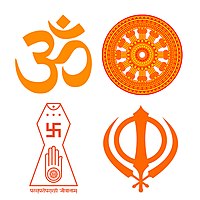Indian religions

Indian religions are a group of different faith systems that are practiced in India. There are several Indian religions, including Hinduism, Buddhism, Sikhism, Jainism, and others. Each religion has its beliefs, practices, and traditions that people follow.
Hinduism is the largest and oldest Indian religion. It is based on the belief in many gods and goddesses, and the ultimate goal is to achieve moksha, which means freedom or liberation from the cycle of birth and death. Hindus believe in the concept of karma, which means that your deeds will impact your next life, and you will be rewarded or punished accordingly. They also follow a caste system, where people are born into a certain social class based on their past lives.
Buddhism, on the other hand, is based on the teachings of Gautama Buddha, who lived in India around 2500 years ago. The main focus of Buddhism is on the Four Noble Truths, which describe the path to reach enlightenment and end the cycle of suffering. Buddhists also practice meditation to achieve inner peace and mindfulness.
Sikhism is a monotheistic religion that was founded in the 15th century by Guru Nanak. They believe in one God and the importance of living a good and honest life. Sikhism also emphasizes the importance of equality among all people, regardless of their caste or social status.
Jainism is another ancient Indian religion that emphasizes non-violence and respect for all living beings. Jains believe in the principle of ahimsa or non-violence and follow a strict vegetarian diet to avoid hurting any living creature.
In conclusion, Indian religions are a diverse group of faith systems that have been practiced in India for centuries. Each religion has its unique beliefs, practices, and traditions that are followed by millions of people in India and around the world.
Hinduism is the largest and oldest Indian religion. It is based on the belief in many gods and goddesses, and the ultimate goal is to achieve moksha, which means freedom or liberation from the cycle of birth and death. Hindus believe in the concept of karma, which means that your deeds will impact your next life, and you will be rewarded or punished accordingly. They also follow a caste system, where people are born into a certain social class based on their past lives.
Buddhism, on the other hand, is based on the teachings of Gautama Buddha, who lived in India around 2500 years ago. The main focus of Buddhism is on the Four Noble Truths, which describe the path to reach enlightenment and end the cycle of suffering. Buddhists also practice meditation to achieve inner peace and mindfulness.
Sikhism is a monotheistic religion that was founded in the 15th century by Guru Nanak. They believe in one God and the importance of living a good and honest life. Sikhism also emphasizes the importance of equality among all people, regardless of their caste or social status.
Jainism is another ancient Indian religion that emphasizes non-violence and respect for all living beings. Jains believe in the principle of ahimsa or non-violence and follow a strict vegetarian diet to avoid hurting any living creature.
In conclusion, Indian religions are a diverse group of faith systems that have been practiced in India for centuries. Each religion has its unique beliefs, practices, and traditions that are followed by millions of people in India and around the world.
Related topics others have asked about:
